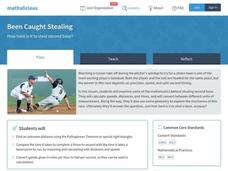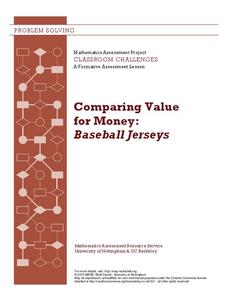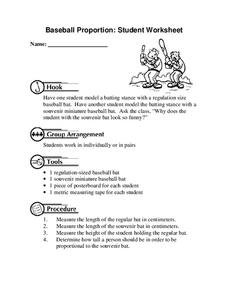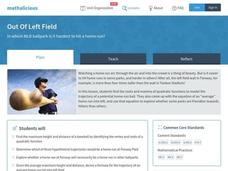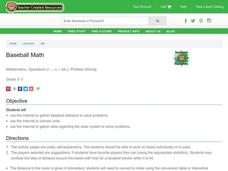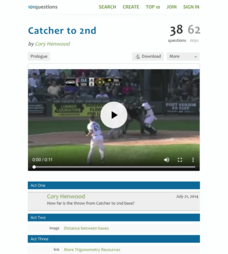Curated OER
Batter Up! Math Stations
Math stations that review important concepts with the real-world example of baseball.
CCSS Math Activities
Baseball Players
Statistics is an important part of baseball. Given the mean weight of players on a baseball team, scholars determine the total weight of the players. They then find the median and range of weights for the opposing team. Lastly, they...
Mathalicious
Been Caught Stealing
You're safe, when calculating the odds of stealing second base! Learners compare the rate of a runner to the distance the ball travels, in a lesson that explores right triangles and measurement. Full of discussion questions and fun...
Curated OER
Comparing Value for Money: Baseball Jerseys
Learners step up to the plate as they first complete an assessment task using linear equations to determine the best company from which to buy baseball jerseys. They then evaluate provided sample responses identifying strengths and...
Curated OER
Decimal Baseball
Young mathematicians represent recorded information in decimal form. In this decimals lesson, learners play a "classroom friendly" basketball game in which pupils take 10 shots. Number of shots made out of 10 is recorded as a fraction...
Curated OER
Baseball Stats
Students explore data sheets and statistics in baseball. They use baseball data available on the Internet to develop an understanding of the different ways in which data can be analyzed.
Curated OER
Baseball Proportion: Student Worksheet
In this mathematics worksheet, students model a batting stance with a regulation size baseball bat. Then they model the batting stance with a souvenir miniature baseball bat. Students measure the length of each bat in centimeters and use...
Teacher's Corner
Hey Batter, Wake Up!
Does jet lag affect a baseball team's performance in games? Read about how a baseball team's chance of winning a game can be affected by traveling over one, two, and three time zones. Readers then respond to five short answer questions...
Curated OER
Science in baseball
Sixth graders examine how science is used in everyday activities, such as baseball.
Mathalicious
Out of Left Field
A baseball trajectory and a parabola seem to make the best pair in real-world quadratic applications. Here is a current baseball resource with questions, discussions, and explorations regarding a quadratic function and home run...
Curated OER
"Two Diamond Baseball" Review Game
Here is a game that can be used across the curriculum. Two teams are made up, and each time a member of the team answers a question correctly, they roll a dice to see how far they advance on the "baseball field." A fun game!
Curated OER
Fantasy Baseball
Check out this thematic unit, based on the game of baseball. Learners investigate numbers and number relations as they become familiar with some of the basic terminology associated with the game. They focus their attention on actual...
Curated OER
Balloon Math: A Game for All Levels
Here is a game that combines exercise with math skills. In this mathematics and P.E. lesson, students hold balloons that have a number written on them, and for a set time do not let the balloons hit the ground. They must catch a balloon...
Curated OER
Baseball Math
Fifth graders complete activity pages. In this operations and problem solving lesson, 5th graders use the Internet to gather baseball statistics, solve problems and convert units.
Curated OER
Calculating Baseball Statistics
Students calculate baseball statistics. In this data analysis lesson, students use baseball statistics to calculate the batting average and slugging percentage. Students visit www.funbrain.com to play a math baseball game.
Intel
Play Ball!
Math and sports meet on the baseball diamond in the first STEM lesson in a series of six that asks pupils to collect and perform comparative analyses of data specific to baseball. Following the analysis, scholars create a presentation...
Curated OER
Frisbee Baseball
Students keep track of the number of tosses it takes them to reach each base, and encourage team members and recognize their successes. To make this activity fit the level of older classes, measure distances and figure averages as you play!
Radford University
Midsummer Classic’s Homerun Derby
Hit a home run with your lessons. A two-part activity has learners explore quadratic equations that model the path of a baseball. They see how changing the initial speed of the ball affects its maximum height, maximum horizontal...
Radford University
Right Triangle Sports
Who knew math could help with sports? An invigorating set of lessons encourages learners to apply right triangles in baseball, volleyball, hockey, football, and soccer. They use the Pythagorean Theorem, Pythagorean triples, special right...
Illustrative Mathematics
3-D Shape Sort
From the apple on your desk and the coffee cup in your hand, to the cabinets along the classroom wall, basic three-dimensional shapes are found everywhere in the world around us. Introduce young mathematicians to the these common figures...
Perkins School for the Blind
Baseball
Baseball is an American pastime, super fun to play, and can be made accessible to learners with visual impairments. Instead of taking to the ball field, your class can learn the rules of the game by playing a small three-dimensional...
101 Questions
Catcher to 2nd
Who's on second? Young mathematicians use a diagram of a baseball field to find the distance a catcher must throw to reach second base. A brief video of such a play during a baseball game sets the stage for the assignment.
Curated OER
Let's Play Mathematical Baseball
Learners explore the concept of spelling geometric terms and words with number prefixes. In this spelling geometric terms and words with number prefixes lesson, students play a game of baseball. Learners spell words correctly to advance...
Curated OER
Variance and Covariance: How much to do baseball players really make?
Is baseball really the road to riches? Here, statisticians look at salary data from baseball players and use variance to measure the spread of the data to more accurately answer that question. Note: The salary data provided is from 1994,...




